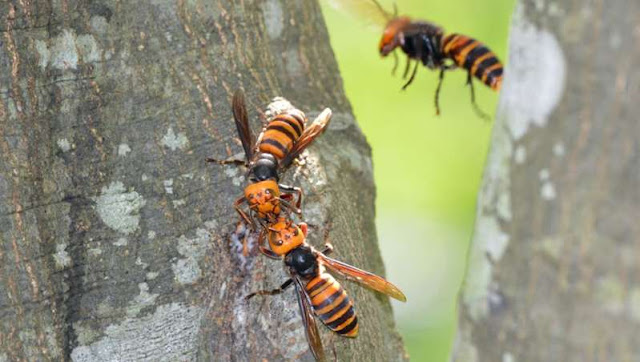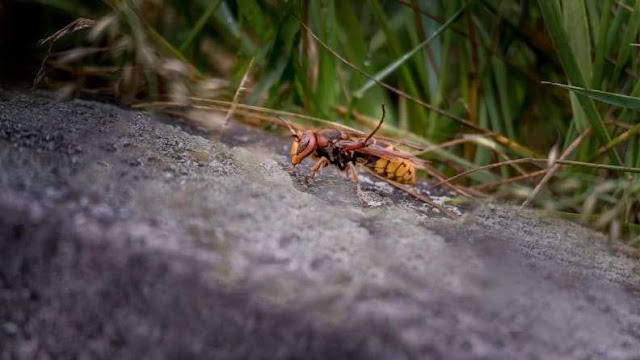Originally posted on msn.com:
Leigh Harrington
![]() © Getty Images / kororokerokero Is that a murder hornet in your yard? Here's what to do—
© Getty Images / kororokerokero Is that a murder hornet in your yard? Here's what to do—
The murder hornets that have been making headlines and
alternately terrifying and fascinating the public this year can be as deadly as
their nickname implies, but their true threat is to honeybee populations,
rather than people.
Also
known as the Asian giant hornet, it is native to eastern and southern Asia,
from parts of Russia and Japan, to Taiwan, South Korea, Vietnam, and Thailand.
Scientists can only guess as to how the hornets initially made it to North
America, but they were first discovered on this side of the Pacific Ocean in
2019, on Vancouver Island, in British Columbia.
With
all the hype surrounding the world’s largest hornet—at up to two inches long,
one is the size of my pinky finger—let's drill down and see what you need to
really be concerned with.
The
most immediate question is: Will these orange-faced, black-eyed,
brown-and-orange-striped monsters show up in your backyard, and if they do what
should you do?
How to identify a
murder hornet
Given
their enormous size, there’s just no mistaking a honeybee, bumble bee, or
yellow jacket for an Asian giant hornet. But, there are a few types of bees
that the untrained eye may confuse, the first being the inch-ish-long
bald-faced hornet. But, being black and white, their coloring is all wrong.
Allen
Gibbs, an evolutionary physiologist at University of Nevada, Las
Vegas, who is an expert in insect physiology and evolution, describes a cousin
to the murder hornet that’s bigger and bears a name that’s just as
fear-inducing.
“We
do have wasps that are even larger than murder hornets, but they aren't black
and yellow, and really can't be misidentified as such,” he says. “They’re often
called tarantula hawks, and they have dark bodies and reddish wings. They do
not resemble hornets at all, and they do not live in the Pacific Northwest.”
Are you and your
children at risk at home?
Despite
their killer nickname, ‘murder’ hornets don’t really pose a bodily threat to
humans, and they’re not interested in stinging you—unless you approach their
nest, so don’t do that.
Gibbs
says, “Don't disturb a wasp nest, if possible. When agitated, wasps emit an
alarm pheromone that stirs up all the other wasps in the colony.”
You’d
have to either be allergic to the sting or be stung multiple times to warrant a
hospital visit. In Japan, where the hornet is considered native, annual death numbers reportedly range
from 30 to 50.
The
real risk posed by Asian giant hornets is to honeybee populations and the
consequent ramifications of decreased pollination on our fresh food supply.
Asian
giant hornets kill honeybees, and do so quickly, decimating a honeybee hive containing
thousands of bees in less than two hours by invading the hive and decapitating
the bees.
More
dead honeybees means less honeybees to pollinate fruit trees, berries, and
vegetable plants that we depend on farms to grow. Scientific American estimates honeybee
pollination as a $15 billion annual enterprise.
Do you need to be on
the lookout for them?
The answer depends on where you live.
Asian
giant hornets like specific climate conditions, and these do not include
extreme heat or extreme cold. Instead, they enjoy the wet, mild weather of
Washington state near the Canadian border, which is where these insects have
been sighted and trapped.
If
you live outside this area, it’s extremely unlikely that the insect you’ve
found is the notorious murder hornet. At least for now. Using computer
simulations, scientists predict that the hornets could
make it to northern Oregon in 10 years, and then into western Oregon,
Washington, and British Columbia after 20 years.
Washington
State University entomologist David Crowder previously told Reviewed’s parent company
USA Today, “It is highly unlikely that the hornets could make their
way across the entire country. Much of the habitat in the central United States
is completely unsuitable habitat for the hornets, as it is too hot and has too
low rainfall. Thus, unless they are moved by humans, it would be nearly
impossible for the hornets to make their way across the country on their own.”
While
the Asian giant hornets would not find the middle of the U.S. particularly
friendly, there are large stretches of both the east and west coasts of the
country that could accommodate them, if transported there by humans.
Gibbs
says, “The number I've seen is that they could spread 50-60 miles per year.
It's hard to see how they'd get to the Midwest or East Coast without
hitchhiking on a truck or train, or by cargo ship (which is presumably how they
got to Washington).”
What to do if you
think you’ve found one in your yard
© Getty Images / Cerise HUA Although it's highly unlikely, if you see an Asian giant
hornet in your yard, report your sighting on the website for Washington State
Department of Agriculture or call an exterminator.
First
thing: Don’t panic. The circumstances have to be just right for an Asian giant
hornet sighting, and the chance that you could find one in your yard is highly
unlikely, even if you do live in murder hornet country.
Also,
consider the time of year. As Asian giant hornets are dormant over the winter
season, it’s even more unlikely you’ll spot one before April.
Andrew
Greess, owner of Quality Equipment & Spray, a pest control company
that’s been operating out of Phoenix, Arizona, for more than 25 years, says,
“They typically begin seeking food in April, and they’re usually most
aggressive during the late summer and fall. It’s during that period that they
normally attack colonies of honeybees.”
For
your safety, you should not try to eradicate the nest on your own—the hornets
can sting through beekeeping gear, and the venomous sting does not feel nice.
Generally
speaking, scientists want to find the hornets alive, so they can tag them and
track them back to their nest. With this in mind, it may seem counterintuitive
to call a pest control expert to handle the problem, but both Greess and Gibbs
agree you should.
“You
should enlist the services of a pest control professional who is trained in the
application of pesticide chemicals,” says Greess.
Gibbs
says that “an exterminator may be appropriate, even in northwest Washington. If
it is one of these [Asian giant hornets], an exterminator should be able to
recognize it as not his or her usual target. And they can collect some dead
specimens and have them identified.”
Not
panicking will yield the best results for everyone. “The probability of these
being ‘murder hornets’ is really low, and state and USDA officials probably
have other things to do than chase these down,” Gibbs emphasizes. “If you do
find really big hornets, over twice big as any you've ever
seen, that's when you want to contact the state [where you live] or the USDA.”
You
can quickly and easily report your sighting on the Washington State Department of Agriculture’s website.
Tips for keeping bees,
hornets, and wasps away
© Getty Images / Helmut Feil and Olga PS Bees, hornets, and wasps are attracted
to sugary scents and foods, especially soda, so don't leave it sitting around
outside in your yard. If you do see a hornet or wasp nest and it's still small,
you can try and tackle it with a spray pesticide.
While
your risk of encountering a murder hornet is low, you will likely have to deal
with the average variety of bees, hornets, wasps, and yellow jackets in your
environment at some point.
Since
bees and wasps are attracted to sweet smells and flavors—like nectar—don’t
leave sugary drinks, soda (especially in cans), or juice unattended outside,
like on your patio table. Likewise, don’t leave trash laying around.
Bees
and wasp species don’t like certain natural scents, which you can incorporate
around an area where you like to congregate, such as your patio or the kids’
swing set. Plantings like lavender, garlic, spearmint, lemongrass, and eucalyptus should do the trick.
Keep
your patio furniture aesthetic more neutrally
toned or in darker hues, since bees are attracted to bright colors. You don’t
want to be confused for a flower.
Regularly
inspect areas where bees and wasps like to make nests. This includes roof
overhangs and eaves, under decks, in sheds, around railings, empty pipes, and
inside the legs of some patio furniture.
If you find a nest, and it’s small (like the size of a golf ball or baseball), you can probably take care of it yourself using a spray at night. But if it's any larger, the safer bet to prevent an angry swarm from chasing you around your yard, is to call in an exterminator.
The Animal Rescue Site is a place where people can help provide food and care to millions of animals in need, both in the U.S. and around the world. In addition to sharing personal rescue stories, shopping for the cause, and signing petitions, visitors can take just a moment each day to click on a purple button to help animals. Visit The Animal Rescue Site and click today - it's free!

Until next time….hug your animals. Tell them you love them. If you don’t have a pet, adopt one. Make adoption your first option when seeking a pet. Adopt. Don’t shop. Can’t adopt. Please consider fostering one. The animal will have the taste of home and the shelter will cover the expenses. Can’t foster? Make a donation or volunteer at your local shelter. Please, don’t hunt. Unless you’re starving down in a ditch somewhere, there is no logical reason to do so. Whatever you do, however you do it, please be a voice for the animals large and small. All it takes is one to make a difference, good or bad.

Together, you and I can make a difference in an animal's life. I’m one for the animals. Are you? Thanks for visiting. Stay safe. Be strong. Be happy. Smile. Show compassion. Be nice to one another. Pass it onward. If you like what you see here, please consider signing up to become a follower. Please feel free to share this post with others.
My writing Blog: http://sjfranciswriter.blogspot.com














No comments:
Post a Comment